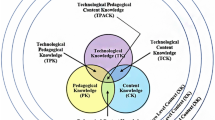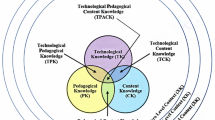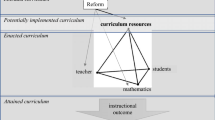Abstract
Enhancing the pedagogy of mathematics teachers (EPMT) project is a hybrid model of professional development (PD) that reflects a gradual shift in the centre of gravity away from the University-based, “supply-side”, “off-line” forms of knowledge production conducted by university scholars for teachers towards an emergent school-based, demand-side, on-line, in situ forms of knowledge production conducted by teachers with support from university scholars. The aims of the EPMT project were threefold: to provide teachers with training, to facilitate teachers’ work (practice and feedback) at the school level and to enthuse and support teachers to contribute towards the development of fellow teachers. This paper examines two project participants’ infusion of their learning in classroom practice. From the lessons enacted by the two teachers it was apparent that both teachers were able to apply their learning in their lessons. The teachers also manifested changes in their perception of teaching mathematics.





Similar content being viewed by others
References
Abdal-Haqq, I. (1995). Making time for teacher professional development (Digest 95-4). Washington, DC: ERIC Clearinghouse on Teaching and Teacher Education.
Ball, D. L. (1996). Teacher learning and the mathematics reforms: What do we think we know and what do we need to learn? Phi Delta Kappan, 77, 500–508.
Ball, D. L., & Cohen, D. K. (1999). Developing practice, developing practitioners: Towards a practice-based theory of professional education. In L. Darling-Hammond & G. Sykes (Eds.), Teaching as the learning profession: Handbook of policy and practice (pp. 3–32). San Francisco: Jossey-Bass.
Berkowitz, S. (1996). Using qualitative and mixed method approaches. In R. Reviere, S. Berkowitz, C. C. Carter, & C. Graves-Ferguson (Eds.), Needs assessment: A creative and practical guide for social scientists (pp. 53–70). Washington, DC: Taylor & Francis.
Borasi, R., & Fonzi, J. (2002). Professional development that supports school mathematics reform. Foundations series of monographs for professionals in science, mathematics and technology education. Arlington, VA: National Science Foundation.
Carpenter, T. P., Fennema, E., Franke, M. L., Levi, L., & Empson, S. B. (1999). Children’s mathematics: Cognitively guided instruction. Portsmouth, NH: Heinemann.
Castle, K., & Aichele, D. B. (1994). Professional development and teacher autonomy. In D. B. Aichele & A. F. Coxford (Eds.), Professional development for teachers of mathematics (pp. 1–8). Reston, VA: National Council of Teachers of Mathematics.
Clarke, D. (1994). Ten key principles from research for the professional development of mathematics teachers. In D. B. Aichele & A. F. Coxford (Eds.), Professional development for teachers of mathematics (pp. 37–48). Reston, VA: National Council of Teachers of Mathematics.
Desimone, L. M. (2009). Improving impact studies on teachers’ professional development: Toward better conceptualisations and measures. Educational Researcher, 38(3), 181–199.
Elmore, R. F. (2002). Bridging the gap between standards and achievement: The imperative for professional development in education. Washington, DC: Albert Shanker Institute.
Ginsburg, A., Leinwand, S., Anstrom, T., & Pollock, E. (2005). What the United States can learn from Singapore’s world-class mathematics system and what Singapore can learn from the United States: An exploratory study. Washington, D.C.: American Institutes for Research.
Glesne, C. (1999). Becoming qualitative researchers: An introduction (2nd ed.). New York: Longman.
Goh, C. T. (1997). Shaping our future: “Thinking Schools” and a “Learning Nation”. Speeches, 21(3), 12–20. Singapore: Ministry of Information and the Arts.
Hargreaves, A. (1995). Development and desire: A postmodern perspective. In T. R. Guskey & M. Huberman (Eds.), Professional development in education: New paradigms and practices (pp. 9–34). New York: Teachers College Press.
Hawley, W. D., & Valli, L. (1999). The essentials of effective professional development: A new consensus. In L. Darling-Hammond & G. Sykes (Eds.), Teaching as the learning profession: Handbook of policy and practice (pp. 127–150). San Francisco: Jossey-Bass.
Kaur, B. (2010). A study of mathematical tasks from three classrooms in Singapore schools. In Y. Shimizu, B. Kaur, & D. Clarke (Eds.), Mathematical tasks in classrooms around the world (pp. 15–33). Rotterdam, The Netherlands: Sense Publishers.
Kaur, B., Seah, L. H., & Low, H. K. (2005). A window to a mathematics classroom in Singapore—some preliminary findings. In Redesigning pedagogy: Research, policy, practice 30 May–1 June 2005. Singapore: Centre for Research in Pedagogy and Practice, National Institute of Education. http://conference.nie.edu.sg/rprpp.
Kaur, B., & Yeap, B. H. (2009a). Pathways to reasoning and communication in the primary school mathematics classroom. Singapore: National Institute of Education.
Kaur, B., & Yeap, B. H. (2009b). Pathways to reasoning and communication in the secondary school mathematics classroom. Singapore: National Institute of Education.
Krulik, S., & Rudnick, J. A. (1999). Innovative tasks to improve critical and creative thinking skills. In L. Stiff (Ed.), Developing mathematical reasoning in grades K-12 (pp. 138–145). Reston, VA: National Council of Teachers of Mathematics.
Krulik, S., & Rudnick, J. A. (2001). Roads to reasoning—developing thinking skills through problem solving [Grades 1–5]. Chicago, IL: Wright Group McGraw-Hill.
Krulik, S., & Rudnick, J. A. (2002). Roads to reasoning—developing thinking skills through problem solving [Grades 7–8]. Chicago, IL: Wright Group McGraw-Hill.
Matos, J. F., Powell, A., & Sztajn, P. (2009). Mathematics teachers’ professional development: Processes of learning in and from practice. In R. Even & D. L. Ball (Eds.), The professional education and development of teachers of mathematics (pp. 167–183). New York: Springer.
Ministry of Education. (undated). Enhanced performance management system. Singapore: Author.
Ministry of Education. (2005). Teach less learn more. Singapore: Author.
Ministry of Education. (2006a). Mathematics syllabus—secondary. Singapore: Author.
Ministry of Education. (2006b). Mathematics syllabus—primary. Singapore: Author.
Ritchie, J., & Spencer, E. (1994). Qualitative data analysis for applied policy research. In A. Bryman & R. G. Burgess (Eds.), Analyzing qualitative data (pp. 173–194). London: Routledge.
Smylie, M. A. (1989). Teachers’ views of the effectiveness of sources of learning to teach. Elementary School Journal, 89, 543–558.
Stiff, L. V. (2002). Study shows high-quality professional development helps teachers most. NCTM News Bulletin, 38(7), 7.
Weber, R. P. (1990). Basic content analysis. Newbury Park, CA: Sage.
Wilson, S. M., & Berne, J. (1999). Teacher learning and the acquisition of professional knowledge: An examination of research on contemporary professional development. Review of Research in Education, 24, 173–209.
Yeap, B. H., & Kaur, B. (2010). Pedagogy for engaged mathematics learning. Singapore: National Institute of Education.
Acknowledgments
This paper is based on the funded project CRP 06/06 BK of the Centre for Research in Pedagogy and Practice at the National Institute of Education, Nanyang Technological University, Singapore.
Author information
Authors and Affiliations
Corresponding author
Rights and permissions
About this article
Cite this article
Kaur, B. Enhancing the pedagogy of mathematics teachers (EPMT) project: a hybrid model of professional development. ZDM Mathematics Education 43, 791–803 (2011). https://doi.org/10.1007/s11858-011-0364-z
Accepted:
Published:
Issue Date:
DOI: https://doi.org/10.1007/s11858-011-0364-z




